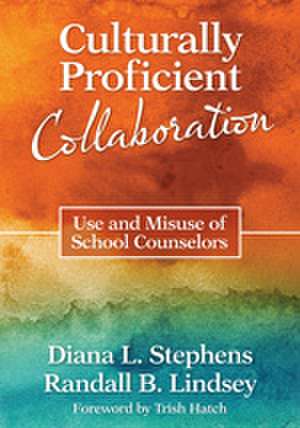Culturally Proficient Collaboration: Use and Misuse of School Counselors
Autor Diana L. Stephens, Randall B. Lindseyen Limba Engleză Paperback – aug 2011
Preț: 166.04 lei
Preț vechi: 217.65 lei
-24% Nou
31.78€ • 32.75$ • 26.83£
Carte indisponibilă temporar
Specificații
ISBN-10: 1412986982
Pagini: 200
Dimensiuni: 178 x 254 x 13 mm
Greutate: 0.42 kg
Ediția:1
Editura: SAGE Publications
Colecția Corwin
Locul publicării:Thousand Oaks, United States
Recenzii
“At a time when many schools do not seem to know what to do with the growing diversity in their populations, this book offers tools for transforming schools into collaborative cultures of care. Stephens and Lindsey are grounded in current best practices promoted by the American School Counselor Association (ASCA) and the Transforming School Counseling Initiative (TSCI), and they recognize the need for school counselors to understand and use data to promote greater equity, genuine cultural appreciation, and vibrant opportunities for all students.”
"With this book, the authors have bestowed a significant gift. Counselors, school leaders, and teachers now have a clear map to guide our journeys toward equitable service. And all of us receive leadership with this clear application of cultural proficiency, as we work to apply this conceptual model to our specific areas of service."
"This is a book that every school counselor, social worker, administrator, and teacher should read and keep on their bookshelves. The authors challenge readers to look within themselves and reflect upon ways they perpetuate and support current counseling practices. The authors leave the reader with a heightened sense of awareness related to Cultural Proficiency Counseling practices and a desire to move beyond traditional methods."
"Culturally Proficient Collaboration provides a framework for serious reflection for successful implementation of a comprehensive guidance program."
"This timely book from Diana Stephens provides the perfect tool set for teachers, counselors and school leaders. It provides practical strategies for delivering necessary counseling services to the marginalized students who need them the most. An indispensable resource for educators who want to make a difference."
"A number of factors contribute to our children feeling disconnected within their families, schools and communities. This disconnect in our culture can sometimes end in acts of violence by word or deed. Culturally Proficient Collaboration will help administrators, teachers and counselors maximize their talents and professional training."
Cuprins
Acknowledgements
About the Authors
Introduction
Part 1. The Changing Role of School Counselor- Schoolwide Leadership
1. A Historical and Contemporary Perspective on School Counseling
Getting Centered
The Intent of This Chapter
Why on Earth do I Need to Know the History of School Counseling?
The Role of Counselor Began in Vocational Guidance
Who Defines the Role of School Counselor?
Counselor as Mental Health Provider
Paradigm Shift: From Reactive Services to Comprehensive Programs
NCLB and Standards-Based School Counseling
Going Deeper
2. 21st Century Counselors Focus on Student Achievement
Getting Centered
The Intent of This Chapter
Times are Changing: The New Role of School Counselor
Counselors Using Data as Catalyst for Transformational Change
Reframing Our Thinking About Data
An Illustration of the Benefits of Counselors Collecting and Analyzing Data
School Counselors as Powerful Leadership Agents of Change
From Gatekeeper to Transformer
Cultural Proficiency Provides a Context
Going Deeper
3. The Tools of Cultural Proficiency Provides a Framework for Collaboration
Getting Centered
Suggested Guidelines as You Consider Cultural Proficiency
Concept of Intentionality
Cultural Proficiency?s Inside-Out Process
Cultural Proficiency: A Paradigm Shift
Cultural Proficiency as a Lens
The Cultural Proficiency Tools
Cultural Proficiency and Counselors
Going Deeper
Part II. Maple View - Sitting in the Fire: A Context for Culturally Proficient Counseling
4. Counselor Collaboration Rubric
Getting Centered
Unpacking the Rubric
Going Deeper
5. Assessing Cultural Knowledge Through Leadership
Getting Centered
Assessing Cultural Knowledge Through Leadership
Using the Rubric: Assessing & Developing Cultural Knowledge through Leadership
Safe School Climate at Maple View Elementary School
Going Deeper
6. Valuing Diversity Through Advocacy
Getting Centered
Valuing Diversity Through Advocacy
Using the Rubric: Valuing Diversity Through Advocacy
Tragedy at Pine View Middle School
Going Deeper
7. Managing the Dynamics of Difference Through Teaming and Collaboration
Getting Centered
Managing the Dynamics of Difference through Teaming and Collaboration
Using the Rubric: Managing the Dynamics of Difference through Teaming and Collaboration
Access Issues at Pine Hills High School
Going Deeper
8. Adapting to Diversity Through Counseling and Coordination
Getting Centered
Adapting to Diversity through Counseling and Coordination
Using the Rubric: Adapting to Diversity through Counseling and Coordination
Pregnancy as an Access Issue at Pine Hills High School
Going Deeper
9. Institutionalizing Cultural Knowledge through Assessment and Use of Data
Getting Centered
Institutionalizing Cultural Knowledge through Assessment and Use of Data
Using the Rubric: Institutionalizing Cultural Knowledge Through Assessment and Use of Data
Pine View Middle School on Faith and Heterosexism
Part III. Next Steps
10. Sustaining Culturally Proficient Counseling: Developing a Personal Action Plan
Sense of Urgency
The ‘Inside-Out’ Process is for – You, Your School and Your Community
Seven Steps for Providing Equity
Resource A. Maple View School District Vignette Story Board
Resource B. Pine View Middle School Schoolwide Needs Assessment (Teacher Version)
Resource C. Matrix: How to Use Cultural Proficiency Books
Resource D. Online Resources for Educator Use
References
Notă biografică
Diana L. Stephens, Ph.D. is an Associate Professor and the Coordinator of the School Counseling PPS Credential Program in the Graduate School of Education at California Lutheran University. She serves on the President¿s Diversity Council and is a member of the Faculty Inclusivity Task-Group. She is a certified Family Life Educator and a Resiliency Trainer. Her collaborative work in K-12 schools and as a counselor-educator in higher education is preceded by her experience in clinical counseling, administration, and consultation in the non-profit sector. Throughout her career, she has been involved in issues of diversity, cultural inclusion, and social justice. She serves as a consultant in educational and organizational communities, conducts professional development workshops, and facilitates collaborative partnerships in co-co-creating culturally inclusive environments. She is guided by the belief that understanding diverse perspectives and honoring the cultural heritage of all humankind is essential in achieving personal and organizational success.
